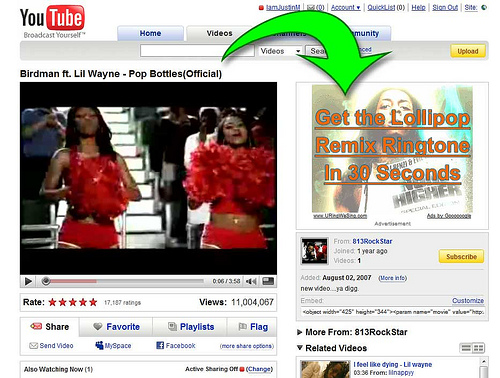 Although the folks at Google doesn’t want to let the public knows the cost and revenue of its acquisition YouTube, but according to the financial brains at Credit Suisse in April, they had estimated that the world’s most popular video sharing platform will spend a good $711m on YouTube this year while pulling in revenues of only $240m. That’s a $470m loss. However, a latest study from RampRate – a firm that claims better IT knowledge than Credit Suisse – says that number is much too high.
Although the folks at Google doesn’t want to let the public knows the cost and revenue of its acquisition YouTube, but according to the financial brains at Credit Suisse in April, they had estimated that the world’s most popular video sharing platform will spend a good $711m on YouTube this year while pulling in revenues of only $240m. That’s a $470m loss. However, a latest study from RampRate – a firm that claims better IT knowledge than Credit Suisse – says that number is much too high.
It claims that YouTube whch was acquired by Google for US$1.65 billion in October 2006 has made a loss of only $174.2 million. This works out to be total expenditure of $2.89 billion by the Californian-based company and has made only $720 million in revenue for the past three years. RampRate’s estimate of a $174 million loss is based on Credit Suisse’s assumption that YouTube will bring in $240 million in ad revenue.
“YouTube as a millstone around Google’s profitability is a mirage. Contrary to Credit Suisse’s estimates of a $470m annual loss, Google is more likely losing a fraction of that amount, due to peering for 73 per cent of its traffic, buying bandwidth from some of the lowest-cost Tier 1 providers, using unprecedented bulk purchasing power to secure very favorable wholesale rates, and running data centers far away from expensive locales,” the report says.

With 76.5 million unique visitors in the United States streaming videos every month be it the latest news reports, Barack Obama’s speeches or funny dances that brightens up you day, most of YouTube’s costs come from the extremely high bandwidth, marketing, running of huge data centers and of course staff salaries. After being bought over by Mountain View 3 years ago, YouTube’s lack of profitibility has sparked off controversy and discussions among analysts arguing whether and when the video sharing platform will become profitable despite the expensive high cost.
Its strongest rival Hulu is catching up with YouTube at a really fast rate and the network television hub has generated $70 million in 2008, according to Screen Digest, despite a relatively tame 6 million unique viewers as compared to YouTube ($100 million) which has attracted 83 million users in the United States. All thanks to its partnerships with major networks to stream their premium shows online, Hulu’s revenue is growing rapidly even it has not gone internationally which I think it should.
For the past few years, the folks in the YouTube team have been racking their brains and hard at work rolling out advertising solutions to monetize its overwhelming popularity, but the video behemoth has been inhibited by the quality of its content. Currently, YouTube supports pre- and post-roll ads, video search advertising and Click-to-buy links. Unfortunately, user generated content, which is a large segment of the site’s offerings, does not attract the kind of large scale campaigns brand advertisers like.
According to a company spokesman, Google is running millions of ads within or near millions of YouTube videos in an effort to reduce the site’s loses. “We want our partners to do well, because when they succeed, we succeed,” the spokesperson said. Several financial analysts said that YouTube’s losses may be shrinking fast and we definitely hope that YouTube would become profitable one day.